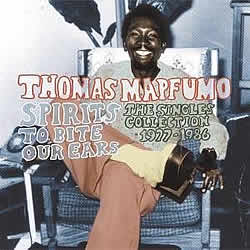|
Back to Index
Spirits
To Bite Our Ears:
Thomas Mapfumo & the Blacks Unlimited
The Singles
Collection 1977- 1986
DBK Works (US)
Cat: DBK 522
Source: African Business /January 2006
  Thomas
Mapfumo - the 'Lion of Zimbabwe' - has been living in Oregon, USA
for just over five years. The reason he left his homeland was the
increasing danger in Zimbabwe for anyone criticising President Robert
Mugabe's autocratic and erratic rule. Thomas
Mapfumo - the 'Lion of Zimbabwe' - has been living in Oregon, USA
for just over five years. The reason he left his homeland was the
increasing danger in Zimbabwe for anyone criticising President Robert
Mugabe's autocratic and erratic rule.
Not that he
feared for his own safety, but when a friend told him there was
a plot against his family he quickly decided that exile was the
only option.
From his base
in Eugene in the Northwest of the US he has continued to record
his music and tour the world - including a couple of courageous
visits to Zimbabwe and appearing at the G8 Eden Project concert
in the UK last July.
Many of his
new songs continue the struggle - that is, they continue to call
Zimbabwe's ruling elite to account and lend support and a voice
of protest for the people.
Despite some
of the hyperbole written about this fascinating artist, it can be
argued that Mapfumo is, essendtially, apolitical. He has always
had a fiercely independent streak, speaking his mind openly while
rejecting formal political allegiances.
And yet the
nascence of his extraordinary career is indelibly linked to his
role in Zimbabwe's independence struggle. Indeed, he calls his music
chimurenga (meaning 'struggle' in Shona), a name commonly used to
describe the liberation war.
Mapfumo was
born in 1945 in Marondera, a small town south-east of what is now
Harare but was then known as Salisbury.
He spent his
formative years like many other young boys - going to school, returning
home to bring the cattle at the end of the day, singing in a small
church choir on Sunday, and helping with household chores.
And there was
still time to enjoy his other great passion, soccer, playing with
his brothers and friends.
Updating tradition
His family were enthusiastic organisers of traditional festivals
and he would sometimes stay up all night listening to Shona drums,
called ngoma, hosho rattles and mbira. The metal keyed mbira instrument
is pivotal to Shona culture.
Played within
a deze (calabash), in the hands of a skilled player the mbira's
hypnotic, rolling melodies can summon the presence of ancestor spirits.
Having left
high school, the young Mapfumo became a professional singer and
entertainer, covering the international hits of the day such as
Elvis Presley songs.
But he never
lost his early love of traditional music and soon hit upon the idea
of incorporating that sound within a contemporary music idiom, and
writing songs that invariably spoke of people's concerns and aspirations.
In fact, there
were a number of other artists that were working along the same
lines.
The most notable
was the late master-guitarist and vocalist Jonah Sithole. In the
early days Sithole's and Mapfumo's bands, The Storm and the Acid
Band respectively, were great rivals.
But eventually
they joined forces to create the Blacks Unlimited, a band that has
been in existence, in one form or another, for some 30 years.
From time to
time Sithole would drift off to form his own band and work on his
own projects. So Mapfumo called upon other equally virtuoso guitarists
- including the famed Joshua Dube, Leonard 'Pickett' Chiyangwa,
and James Chimombe. But Sithole always said he enjoyed playing with
him - that Mapfumo's exquisite vocals and phrasing were perfect
for his own playing style.
While this album
of 17 early recordings does not come with extensive line notes that
might tell us which musicians are playing on which track, they nevertheless
carry Mapfumo's long time friend and guitarist, Banning Eyre's,
informative interpretation of what the Shona lyrics mean.
Perhaps the
best known song is a classic mbira number that has been Mapfumo's
repertoire for many years. Titled Pidigori, it tells of an arrogant
man whose passing is mourned by no one. Once it may have alluded
to Ian Smith, the notorious Rhodesian rebel prime-minister who held
out for so long against the demands for liberation and majority
rule. Today it could be addressed to anyone whose obstinacy causes
people to suffer.
Other tracks
include Pachinyakare that dates from 1981. We are told that it is
one of Mapfumo's first songs to suggest that life was less than
perfect in independent Zimbabwe.
Another song
of the same year gives advice to a young bride. "Joyce",
the falsetto voice of an
Aunt sings, "now that you are married, leave all your bad habits
behind."
Perhaps the
most powerful political song is Tongosienda, recorded in 1986. Here
Mapfumo appeals to the peoples of neighbouring Mozambique to resist
the rebel Renamo movement then backed by South African Apartheid
government of President P.W. Botha. Against the hurdy-gurdy keyboard
of Charles Makokova, Mapfumo almost teases the listener with his
repetition of verses before the band's female backing vocalists,
the Singing Daughters, swoop in with a series of souring choruses.
Spirits to Bite
our Ears is as an extraordinary compilation of the early work of
one of Africa's greatest voices.
Please credit www.kubatana.net if you make use of material from this website.
This work is licensed under a Creative Commons License unless stated otherwise.
TOP
|

